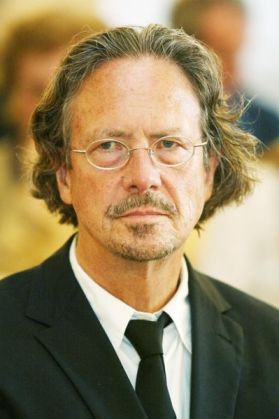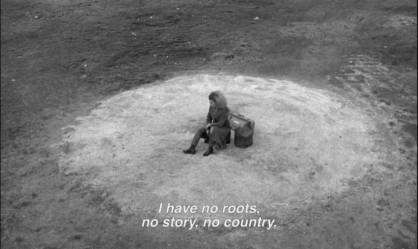From the sea of Paros to the sky over Berlin!
 Today I want to reminisce on the wonderful film “Wings of desire”, made in 1987 by Wim Wenders.
Today I want to reminisce on the wonderful film “Wings of desire”, made in 1987 by Wim Wenders.
The title in German is “The sky over Berlin”, whereas for unknown reasons the title in English is the corny “Wings of Desire”.
The story is simple like a fairy tale. Two Angels, Damiel (Bruno Ganz) and Cassiel (Otto Sanders), go around Berlin listening to what people are saying, stand on high places and statues, medidate, think about the past. Ordinary humans cannot see them, nor can they hear them speak.
This film is shot in black/white and color. The Angels cannot see color. Therefore, when the shot is from the angels’ point of view, the shot is black and white (with a blue tint), and when the shot is from a human point of view, it is in color.

Damiel’s wanderings lead him to a small circus, where he meets Marion (Solveig Dommartin), a trapeze artist. Talented and lovely, Marion is also angst-ridden and profoundly lonely. She confines herself to her trailer after performances, dances alone to the live music of Nick Cave and the Bad Seeds, and drifts through the city, trying to fulfill her “desire for love, desire to love.” Yet she fails to connect with anyone.

Apparently, angels have similar existential problems. Being eternal, Damiel has neither a beginning nor an end, and therefore lacks definition. He wants the simple pleasures of a finite existence: to feed a cat, enjoy a meal, tell a lie.
Divinity has its purpose, but as Peter Falk, playing himself as a former angel, informs Damiel, there is nothing to compare to the sensations of the finite. Falk became famous in the US with his portrayal of Detectiv Columbo, the absent minded naive but very efficient police crime detective. 
Falk’s role also connects the film to history. He’s come to Berlin to make a movie about a private detective in WWII, and extras stand around on the set wearing Nazi uniforms and clothes marked with the Star of David. The past is alive and well within the city, and old newsreel footage is cut into Wings of Desire, seen from car windows, the ghost of memory. It’s another division between realms, one of many in the movie. Wim Wenders and cinematographer Henri Alekan (Topkapi), along with assistant director Claire Denis, create a vivid visual division between the heavenly and the earthly.
 The angels and what they see are shot in crisp, cool black-and-white (restored here to a more silvery hue rather than the gold of previous DVDs) while the mortal experience is shown to us in full color, rich in tone and often garish. Humanity experiences the full spectrum, whereas the angels’ vision is limited. For all of their peeping in on our brains, the angels are confined. They can’t do anything else. This is the core of existentialism: choice is what makes us free. Our imperfections define us. The brightest light burns half as long.
The angels and what they see are shot in crisp, cool black-and-white (restored here to a more silvery hue rather than the gold of previous DVDs) while the mortal experience is shown to us in full color, rich in tone and often garish. Humanity experiences the full spectrum, whereas the angels’ vision is limited. For all of their peeping in on our brains, the angels are confined. They can’t do anything else. This is the core of existentialism: choice is what makes us free. Our imperfections define us. The brightest light burns half as long.
At another level, Wings of Desire is about a world divided, about the line between the spiritual and the physical, the fanciful and the practical. Between the poetry of words and thought and the true poetry of life.
The screen play is written by Peter Handlke, the Austrian poet and play write. I came to know his work with “The fear of the goalie before the penalty kick”, and then with “Kaspar Hauser”.

In addition to the script, he wrote the poem “Song of Childhood” for the movie. Here is an excerpt:
“When the child was a child,
It was the time for these questions:
Why am I me, and why not you?
Why am I here, and why not there?
When did time begin, and where does space end?
Is life under the sun not just a dream?
Is what I see and hear and smell
not just an illusion of a world before the world?
Given the facts of evil and people.
does evil really exist?
How can it be that I, who I am,
didn’t exist before I came to be,
and that, someday, I, who I am,
will no longer be who I am?”
THE END




Χμ! Δε το εχω δει το εργο. Θα το δω και μετα σχολιο, ενδιαφερον μου φαινεται.
να το δειτε, ελπιζω να σας αρεσει, παρολον οτι ο κοσμος εχει αλλαξει πολυ απο εκεινη την εποχη του “Τειχους”
ούτ’εγώ…
να το δειτε κι εσεις γαβριηλ!!!!
Ο πολυγραφωτατος δασκαλος..εκτος απο σεφ, τωρα μας εκπλησει και με τις κριτικες του περι ταινιων και αλλων τινων του σινεμα..
Θα το δω!!! Καλημερες
υπερβολες….
Το ποίημα “Song of the Childhood” εξαντλεί θα έλεγα τα υπαρκτικά ερωτήματα. Απάντηση δεν υπάρχει. Αντί αυτής υπάρχει η επιθυμία, η κίνηση δηλαδή προς το καλλών κάλλος, σαν χρώμα, σαν άρωμα, σαν έρωτας. Υπάρχει δηλαδή μέλλον, υπάρχει κόσμος. Η συνέχεια επί της οθόνης για το πως θα ήταν η απάντηση αν υπήρχε και προσοχή τα ασπρόμαυρα.